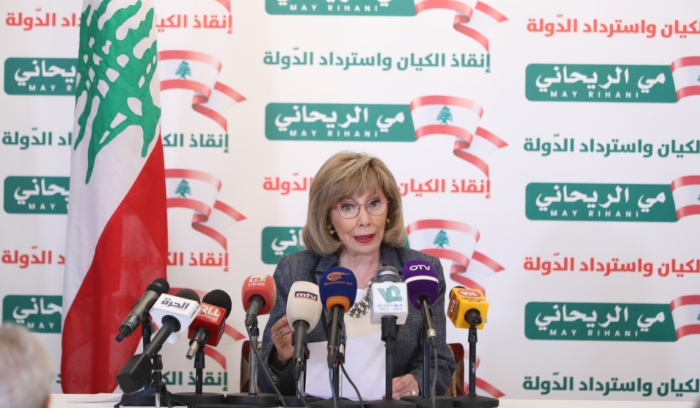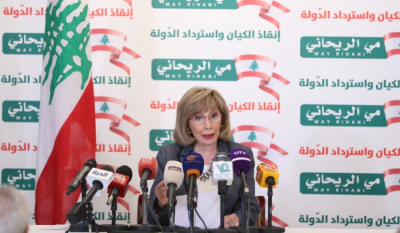Lebanese writer and global development expert May Rihani announced her candidacy for the presidency, following persistent requests from civil society activists, both residents and expatriates, as well as strong support from political, academic, cultural, and economic figures. She believes in every Lebanese, resident and expatriate, who works to maintain their dignity in this homeland and secure a better future for themselves and their families.
In a press conference attended by civil society figures and economic, academic, and media personalities, Rihani stated that the salvation of the entity and the restoration of the state are her main objectives for running. She explained her vision based on "protecting Lebanon's identity," founded on freedom and enhancing democracy, and "strengthening the authority and sovereignty of the state" by empowering state institutions to exercise complete authority over all its territories, which means "exercising its full sovereignty over everything related to managing state affairs and its institutions." Rihani emphasized the importance of "ensuring judicial independence" as a fundamental condition for applying the law and establishing social justice. She stressed the necessity of working to achieve and "ensure the strength and readiness of legitimate military and security institutions" as a vital entry point for imposing the state's prestige.
Her vision also includes a focus on "separating state agencies and institutions from partisan conflicts and sectarian quotas." Rihani called for enhancing the role of the diaspora in political decision-making, while her vision also encompassed "strengthening Lebanon's relationship with Arab countries and the international community." She announced her electoral program, centered around four points: the constitution, justice, equality, and the financial, economic, and social situation, as well as reforms and foreign policy. Rihani noted that the constitution is her primary reference and emphasized that "adhering to the constitutional provisions is essential for the establishment and survival of the state," which necessitates coordination and cooperation between the presidency, the government, and the parliament.
She pledged to work on "establishing a new electoral law that guarantees transparent representation for Lebanese citizens and respects constitutional requirements" and a party law that contributes to creating a political life free from sectarian disputes and personal ambitions. Her electoral program also includes working to "implement judicial independence and free it from interventions," linking this to the principles of justice and equality, not only for the port explosion crime but for all illegal matters and combating corruption.
The presidential candidate committed in her electoral program to "protecting the funds of 80% of depositors," based on a comprehensive plan to save the Lebanese economy, identifying accelerating the agreement with the International Monetary Fund as a priority in this plan. She also announced plans for a series of reform steps and combating corruption, beginning with "launching an evaluation path for the performance of the Central Bank and the banking sector," and "developing a master plan for infrastructure and public services," and working on financing it innovatively, such as in electricity, water, waste, communications, and transport networks.
Regarding foreign policy, Rihani stressed "neutralizing Lebanon from regional and international conflicts, building constructive relationships with all, and liberating national decision-making from the influence of any of these conflicts." When asked why she believes expatriates have decided to engage in national work now when they used to provide financial assistance from a distance, she replied that the Lebanese diaspora is part of the people, with full rights, and that expatriates have always cared about Lebanon's affairs in all respects, suffering similarly to residents, and that they cannot allow Lebanon to collapse. Hence, the decision for expatriates to participate in political decision-making comes from their global connections to serve Lebanon.
When asked about how she would restore trust and the Arab and international dimensions of Lebanon, she affirmed the importance of these aspects, stating that Lebanon must rebuild its relationships with Arab countries. She noted that there are multiple perspectives on Arab countries, including political, economic, and cultural aspects, and emphasized the significant cultural relationship with Egypt, as well as the important economic perspectives with Saudi Arabia and Gulf countries, asserting the need to protect these relationships based on new governance concepts.
In response to questions regarding her stance on sovereign files, she asserted that the constitution is the ultimate reference and that she would not deviate from any of its articles. Rihani highlighted the necessity of creating a constitutional committee consisting of advisors, sharing her insights from a leadership study at Harvard University, which detailed successful, average, and failed leaderships, stressing that the key to successful leadership is consulting experts and not making unilateral decisions. She pointed out the urgency of implementing any decisions without procrastination.
When asked whether communication with Hezbollah is essential for any president to reach Baabda, she confirmed her openness to engage with all Lebanese and emphasized her willingness to listen to everyone. She stated that Hezbollah is a segment of society, but there is no mandatory passage for the presidency.
Regarding what projects she would initiate to reduce youth migration tied to the conference's theme of "salvation of the entity and restoration of the state," she explained that the problem in Lebanon is not only economic but also political. By understanding Lebanon's Arab and international dimensions, they can begin addressing these issues politically and economically. She emphasized the need for Lebanon to engage globally and recognize new globalization trends. The beginning point would be an agreement with the International Monetary Fund, but she highlighted that while the fund is not the solution, it is a key factor in restoring confidence in Lebanon with world countries; this confidence is what will invigorate the economy, not just the agreement with the IMF.
Finally, Rihani expressed skepticism about any candidate promising to return 80% of depositor funds, asserting that such a promise seems impossible.




